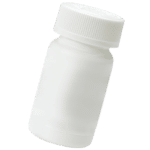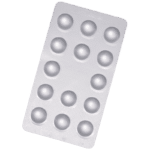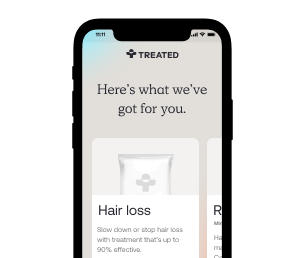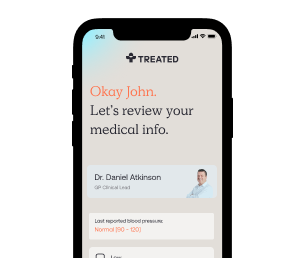Overactive bladder
Get urinary symptoms under control.
Secure delivery
UK clinicians
An overactive bladder can make life inconvenient for a lot of men. It can involve having to go to the bathroom frequently, and sometimes during the night too.
Order overactive bladder treatment online to get back on track and feel more like yourself again.
Overactive bladder (OAB) is a condition in which you feel a frequent urge to urinate, which can be hard to control. It can lead to you leaking urine unintentionally (incontinence), having to take regular trips to the toilet and waking up multiple times in the night to urinate.
It can be a cause of distress and embarrassment for a lot of men, and can stop them from getting involved in normal daily activities, or isolating them from their work and social lives.
You’re typically more likely to suffer from overactive bladder as you get older. It can happen to both men and women, but this page is for overactive bladder in men specifically.
As you age, your prostate gland is more likely to become enlarged, which puts pressure on your bladder and contributes to an increased urge to urinate more frequently. You’ll also be more likely to suffer from an overactive bladder if you’re suffering from any cognitive issues, such as Alzheimer’s. Or if you’ve had a stroke, for example (the likelihood of which increases with age).
It’s a very common condition, which is estimated to affect around 16.6% of people over the age of 40. It affects both men and women equally, but the symptoms between them differ. With women, urge incontinence (an urge to urinate that is too strong, causing you to urinate before you get to the toilet) is seen more commonly than in men.
Even though it’s a very common condition, embarrassment about it can often stop men from getting medical advice and treatment. In a study from 2009, only 45.7% of people with OAB had spoken to a clinician about their symptoms, and only 8.1% were undergoing treatment for it.

How we source info.
When we present you with stats, data, opinion or a consensus, we’ll tell you where this came from. And we’ll only present data as clinically reliable if it’s come from a reputable source, such as a state or government-funded health body, a peer-reviewed medical journal, or a recognised analytics or data body. Read more in our editorial policy.
Overactive bladder is usually caused by other conditions related to ageing. In two thirds of cases in men, OAB is caused by an obstruction to urinary outflow from your bladder due to enlarged prostate (or BPH). Essentially, if your prostate becomes too large, it can put pressure on your bladder, making it harder for your bladder to empty properly. This in turn causes increased urge and urinary frequency.
It can also be caused by neurological conditions like stroke, Alzheimer’s or Parkinson’s, as your brain sends incorrect signals to your bladder. Sometimes, though, overactive bladder can be triggered by more of a temporary issue, like drinking caffeinated or alcoholic drinks, or constipation - which can also put pressure on your bladder.
The symptoms of OAB typically include an increased urge and frequency to urinate. Sometimes this can lead to incontinence (urinating unintentionally, or before you can make it to a toilet). It may also lead to you waking up throughout the night to go to the bathroom, or make it difficult for you to completely empty your bladder.
Although it won’t usually lead to any other physical problems, it may trigger psychological difficulties, such as depression and enjoying sex less.
You’re certainly not alone if you have an overactive bladder though. It’s a common condition, and there is help at hand if you reach out to a clinician. They’ll be able to offer you advice and treatments for it, which will likely improve your quality of life and mental health.

How we source info.
When we present you with stats, data, opinion or a consensus, we’ll tell you where this came from. And we’ll only present data as clinically reliable if it’s come from a reputable source, such as a state or government-funded health body, a peer-reviewed medical journal, or a recognised analytics or data body. Read more in our editorial policy.
Although some people might be able to live with their OAB simply by making some lifestyle changes, treatment is often needed to help you to gain more control over your bladder.
Alpha blockers are commonly prescribed medications to help with OAB in men. These work by relaxing the muscles around your bladder in order to reduce blockages. Alpha blockers will usually be quite useful if you’re also suffering from an enlarged prostate. Another option is to get drugs that reduce spasms in your bladder. These will reduce your urges to urinate.
There isn’t a ‘best’ treatment as such for overactive bladder. It’s a case of finding the right medication for you. Some people will be better suited to certain treatments than others due to their own health needs, as well as their preferences. Identifying the right treatment for you can also involve some ‘trial and error’.
If you’re wondering what the best OAB treatment is for you, chat to our clinician. They’ll be able to help you choose the most suitable medication for your needs after you’ve talked to us about your health.
Overactive bladder doesn’t always need treatment. In fact, if you can regain control over your bladder function with some lifestyle changes, then this is always the preferred option to taking medications. This is because it eliminates the risk of side effects, and also because even if you do take medications for it, they’ll work better if you take them alongside making lifestyle adjustments.
You should be able to help your OAB symptoms if you:

How we source info.
When we present you with stats, data, opinion or a consensus, we’ll tell you where this came from. And we’ll only present data as clinically reliable if it’s come from a reputable source, such as a state or government-funded health body, a peer-reviewed medical journal, or a recognised analytics or data body. Read more in our editorial policy.
Have something specific you want to know? Search our info below, or ask our experts a question if you can’t find what you’re looking for.

Treats BPH and an overactive bladder. Once a day capsule for greater control.

Branded treatment for an enlarged prostate. Gets to work on symptoms within a few weeks.

An effective treatment for enlarged prostate. The generic version of Proscar.

Registered with GMC (No. 4624794)
Meet Daniel
Registered with GPhC (No. 2202465)
Meet Sanjeda
Registered with GPhC (No. 2070724)
Meet Craig
Always read the leaflet that comes with your medication and tell us about any side effects you get.
We know health, but you know you.
Our experts tell you what’s safe, but you decide what’s best.
Answer a few questions and tell us about yourself. Get tailored advice from our clinicians so you can choose better.

Choose your treatment and how often you have it delivered.

We know things change. It’s the nature of life. We’ll check in regularly to make sure your treatment is still right for you.
Pause. Change. Skip. Start again. Any time you like.
Here are some other things we can help with.
Let’s make BPH treatment simpler. Get ongoing care from our clinicians, but without the hassle of appointments.
Tablets, creams, injections. Get expert advice and choose the ED treatment that’s best for your life.
Cream, tablets, spray. PE treatment is available. Our experts can support you to find the best solution for you.
We're making healthcare more about you. Sign up to our newsletter for personalised health articles that make a difference.
Disclaimer: The information provided on this page is not a substitute for professional medical advice, diagnosis, or treatment. If you have any questions or concerns about your health, please talk to a doctor.
The impact of overactive bladder, incontinence and other lower urinary tract symptoms on quality of life, work productivity, sexuality and emotional well-being in men and women: results from the EPIC study. BJU international, [online] 101(11), pp.1388–95. Available at: [Accessed 2 Dec. 2019].
Overactive bladder in males. Therapeutic Advances in Urology, [online] 1(4), pp.209–221. Available at: [Accessed 23 Nov. 2021].
We couldn't find what you're looking for.
Here's everything we treat. Or, if you're looking for something we don't have yet, you can suggest something.
If there’s a particular treatment or condition you’re looking for, tell us and we’ll look into it for you.
Submit your question here, or tell us if you’ve found an issue on our site.
We’ll get back to you very soon. We aim to respond to all queries in one working day.
You’re signed up to our newsletter. Keep an eye on your inbox for our latest update.
By clicking 'Subscribe now' you're agreeing to our Privacy Policy.
We’ve sent you an email asking you to confirm your email address.